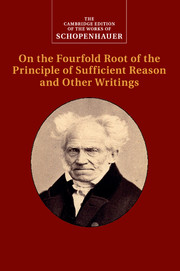Book contents
- Frontmatter
- Contents
- General Editor’s Preface
- Editorial Notes and References
- Introduction
- Notes on Text and Translation
- Chronology
- Bibliography
- Collation of the Two Editions of On the Fourfold Root
- 1 On the Fourfold Root of the Principle of Sufficient Reason
- 2 On Vision and Colours
- 3 On Will in Nature
- Glossary of Names
- Index
Second Chapter - Survey of What is Most Important in Previous Teachings About the Principle of Sufficient Reason
Published online by Cambridge University Press: 30 June 2022
- Frontmatter
- Contents
- General Editor’s Preface
- Editorial Notes and References
- Introduction
- Notes on Text and Translation
- Chronology
- Bibliography
- Collation of the Two Editions of On the Fourfold Root
- 1 On the Fourfold Root of the Principle of Sufficient Reason
- 2 On Vision and Colours
- 3 On Will in Nature
- Glossary of Names
- Index
Summary
FIRST STATEMENT OF THE PRINCIPLE AND DISTINCTION BETWEEN TWO MEANINGS OF THE SAME
Amore or less exactly determined abstract expression for such a fundamental principle of all cognition must also have been found very early; thus, it would be difficult and, moreover, not of great interest, to demonstrate where such a one first occurs. Plato and Aristotle still do not formally advance it as a fundamental principle; however, they more frequently express it as a self-evident truth. So Plato says, with a naïveté that seems to contrast with the critical investigation of modern times as the state of innocence contrasts with knowledge of good and evil: ‘it is necessary that all which occurs, occurs with a cause, for how could it occur without a cause?’ Philebus p. 240 Bip. and again in the Timaeus (p. 302) ‘everything that occurs must necessarily occur through some cause, since it is impossible for something to occur without a cause’. – Plutarch, at the close of his book, On Fate, cites among the fundamental principles of the Stoics: ‘the most important and first appears to be that nothing occurs without a cause, but everything according to preceding causes.
In the Posterior Analytics i, 2, Aristotle to some extent states the principle of reason in the words: ‘we think we understand a thing perfectly whenever we think we know the cause by which the thing is, that it is really the cause of that thing, and that the thing cannot possibly be otherwise.’ In his Metaphysics Book iv, ch. 1, he already give a classification of the different forms of grounds, or rather the principles, αρΧαί;, of which he accepts eight forms, though the classification is neither thorough nor precise enough. However, he says here perfectly correctly: ‘now it is common to all principles that they are the first thing through which anything is, or occurs, or is known.’ In the following chapter he distinguishes sundry forms of causes, although along with some superficiality and confusion. However, better than there, he states four types of causes in the Posterior Analytics ii, 11: ‘there are four causes: the first is that which is the essence of a thing; the second is that by which it must necessarily be; the third is that which first puts it in motion; the fourth is its purpose.’
- Type
- Chapter
- Information
- Schopenhauer: On the Fourfold Root of the Principle of Sufficient Reason and Other Writings , pp. 11 - 28Publisher: Cambridge University PressPrint publication year: 2012



